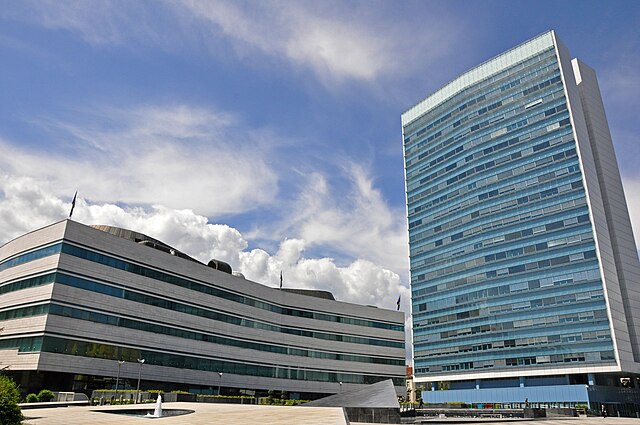Politics of Bosnia and Herzegovina
The politics of Bosnia and Herzegovina are defined by a parliamentary, representative democratic framework, where the Chairman of the Council of Ministers of Bosnia and Herzegovina, named by the Presidency of Bosnia and Herzegovina, is the head of government. Executive power is exercised by the Council of Ministers of Bosnia and Herzegovina and the Presidency of Bosnia and Herzegovina. Legislative power is vested in both the Council of Ministers and the Parliamentary Assembly of Bosnia and Herzegovina. Members of the Parliamentary Assembly are chosen according to a proportional representation system. The judiciary is independent of the executive and the legislature.
Office of the High Representative in Sarajevo
The Presidency Building in central Sarajevo
Parliamentary Assembly of Bosnia and Herzegovina
The Presidency Building, seat of the Constitutional Court of Bosnia and Herzegovina
Parliamentary Assembly of Bosnia and Herzegovina
The Parliamentary Assembly of Bosnia and Herzegovina is the bicameral legislative body of Bosnia and Herzegovina. It consists of the following two chambers.The House of Peoples has 15 members, appointed by the parliaments of the entities: 5 members elected by the National Assembly of Republika Srpska, 5 members - by the Bosniak club of the House of Peoples of the Parliament of the Federation of Bosnia and Herzegovina and 5 members - by the Croat club of the House of Peoples of the Parliament of the Federation of Bosnia and Herzegovina.
The House of Representatives has 42 members, elected for a four-year terms by proportional representation.
Parliamentary Assembly of Bosnia and Herzegovina
Image: Ratomir Dugonjić
Image: Visit of Džemal Bijedić, Yougoslav Prime Minister, to the CEC (cropped)
Image: Momcilo Krajisnik crop








